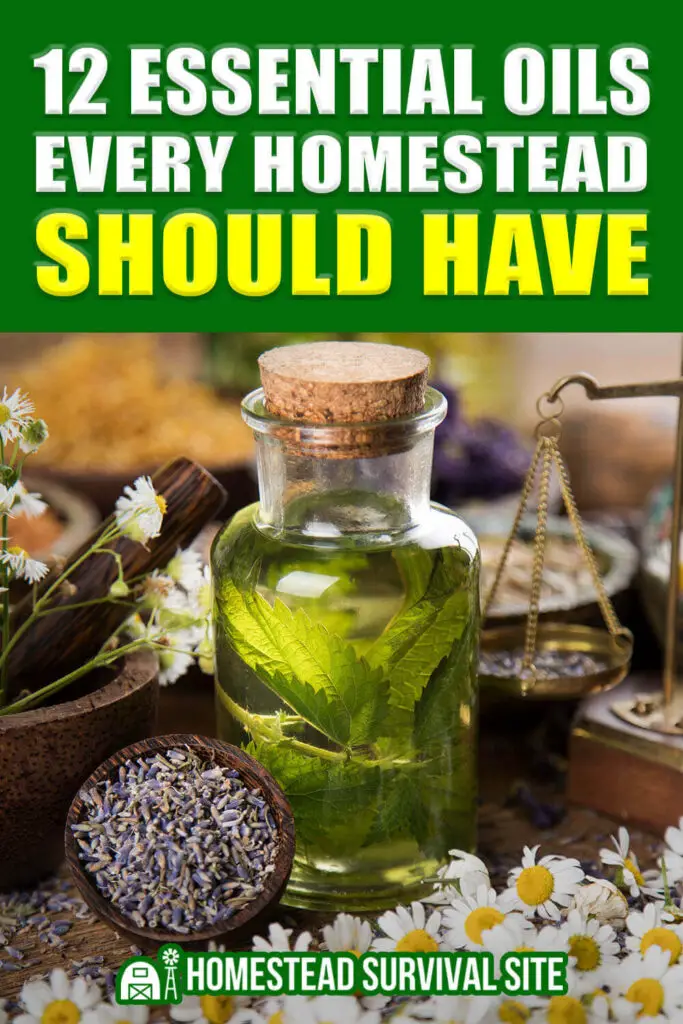Estimated reading time: 6 minutes
Essential oils went through a surge in popularity, and for a very good reason. They have all kinds of uses and benefits, especially on the homestead.
Please keep in mind that while there is no scientific evidence showing essential oils can treat or cure diseases, there is anecdotal evidence for their use. Of course, there are plenty of uses other than medical uses for essential oils.
Some essential oils can be used for cooking, but make sure you use food-grade oils that are safe for consumption. It’s up to you to do your own research and decide what’s best for you, but here is a list that can help you consider which essential oils every homestead should have.
Want to save this post for later? Click Here to Pin It On Pinterest!
1. Tea Tree Oil
You’ll have plenty of uses and reasons to keep tea tree oil around on the homestead. According to Healthline, tea tree oil contains compounds that are shown to kill bacteria, fungi, and viruses. It also increases white blood cell activity, treats fungal infection, and improves healing.
Tea tree oil can be used as an insect repellent, antiseptic for minor cuts or scrapes, treat acne and nail fungus, soothe skin, and treat athlete’s foot and other skin conditions.
In addition, you can use it to make cleaning solutions, hand sanitizer, and mouth wash. You can add a few drops of tea tree oil to your homemade laundry soap to boost its cleaning power. It may also help to prevent that stinky smell-buildup in your work clothes. Diluted tea tree oil can be sprayed on garden plants as an antifungal.
Tea tree oil should always be diluted if you are going to use it on your skin.
2. Clove Oil
Clove oil can be used to temporarily soothe the pain of a toothache. It is also thought to have anti-microbial properties, and it may stop or slow the growth of yeast and bacteria.
You can mix clove oil with garlic and water to make a liquid fence. Then, spray it around the edges of your garden to keep rabbits away.
3. Oregano Oil
Ancient Greece recorded some of its uses of Oregano oil, such as headaches, spider bites, and wounds. Oregano oil's use shouldn’t be too surprising, as it is thought to have antiviral, antibacterial, anti-inflammatory, and antifungal properties.
Oregano oil can be used to ward off pests, soothe skin issues, be used as a mouth wash, and even inhaled to relieve congestion. Oregano oil is typically diluted with a carrier oil to prevent burning or irritation to the skin.
4. Lavender Oil
Lavender oil is one of the most popular and most widely used essential oils. Aside from its lovely fragrance, it has many benefits, too. It is often used to flavor drinks and to be a fragrance in soaps and cosmetic products, especially if you are making your own on the homestead. Just a few drops in your homemade cleaning products will help your home smell fresh and clean.
According to WebMD, lavender calms the central nervous system, helping you to reduce anxiety and sleep better, especially when diffused. It may also promote wound healing and minimize aging when applied to the skin.
5. Peppermint Oil
Peppermint has been used for treating various health conditions for thousands of years. It contains menthol, which causes a cooling sensation. Peppermint oil has been used topically for soothing muscle aches and headaches, especially tension headaches.
Aromatherpacilly, peppermint has been used for focus and mental clarity. In addition, you can spray peppermint oil around your home to deter pests such as bugs and mice. Or place a few drops of peppermint oil on some cottonballs and place them anywhere you see mouse or bug activity.
6. Orange Oil
A few scientific studies have shown that orange oil may be beneficial in stopping the growth of certain bacteria and fungi. It’s also used in aromatherapy to reduce stress and anxiety. In addition, orange oil can add a clean, refreshing scent to your home.
You can add a few drops of orange oil to cleaning sprays to cut grease, and it also has some insecticidal properties, as well. You can spray it anywhere you want to deter pests, such as around windows and doors.
7. Lemon Oil
If you purchase food-grade lemon oil, you can use it for flavoring desserts and homemade candies. Another popular way to use lemon oil is to add it to your cleaning spray to cut grease and oil. You can also use lemon oil to remove sticky stuff like tree sap, dissolve adhesive labels, and help your home smell fresh.
8. Lemongrass Oil
Lemongrass oil has antibacterial, antifungal, anti-inflammatory, and antioxidant properties. It is thought to reduce headaches, and digestive issues, relieve pain and reduce stress and anxiety.
You can add a few drops of lemongrass oil to your daily moisturizer to help clear the skin. And applying it topically may act as a mosquito repellent, although you’ll need to reapply it frequently. Unfortunately, some people may be sensitive to lemongrass oil.
9. Eucalyptus Oil
Eucalyptus is popular in cold medicines, such as Vick’s Vaporub. The eucalyptus oil vapors are thought to reduce congestion, helping you breathe better when you’re sick, so you may try putting a few drops of oil on a cloth near you or in a diffuser.
It’s also used in pest repellents that are ‘all-natural’ and don’t use DEET, such as OFF! A few drops of eucalyptus oil on your clothing may work similarly or put a few drops on cotton balls where you may want to deter pests.
Eucalyptus is also used in over-the-counter creams aimed at reducing arthritis and associated pain, as well.
10. Geranium Oil
The ancient Egyptians used geranium for beautiful, radiant skin. In addition, a few drops of geranium oil diluted in a carrier oil may help treat and prevent acne. It may also repel bugs as well as soothe bug bites. Diffusing geranium oil is thought to reduce anxiety and stress, as well.
11. Cedarwood Oil
This woodsy-scented oil will help to repel ticks, fleas, and moths. A few drops on your pajama sleeves may also promote better sleep and reduce anxiety. Cedarwood also helps to neutralize foul odors.
Cedarwood oil can be used to recondition cutting boards, wooden tools and utensils, and even wood furniture and may help prevent mildew from setting in. Cedarwood is also thought to restore hair loss, so you can add a few drops to your favorite shampoo or beard wash to improve hair.
You may be able to ward off slugs by putting a few drops of cedarwood in water and using it to make an invisible fence around your plants.
12. Frankincense Oil
Frankincense has been used in traditional Chinese medicine for many years to fight inflammation, pain, and swelling. Frankincense may reduce inflammation and fight asthma and improve oral health.
Frankincense oil can be used to clean and sanitize hard surfaces, such as countertops.
Like this post? Don't Forget to Pin It On Pinterest!











Might wanna mention tea tree oil should not be ingested.